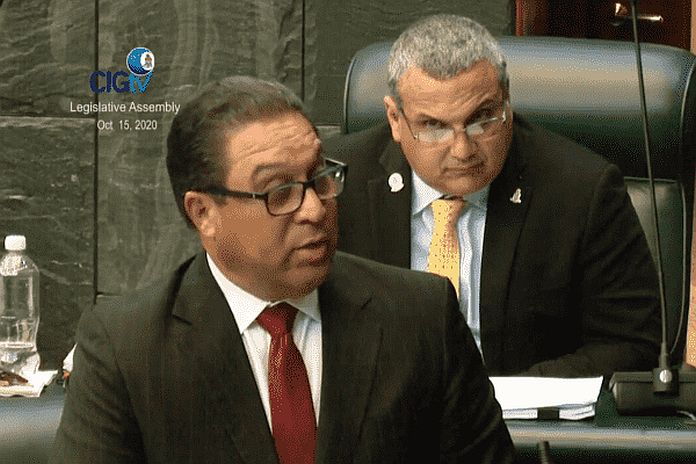GEORGE TOWN, Cayman Islands (CNS) – Premier Alden McLaughlin has said he doesn’t believe the UK is considering forcing the Cayman Islands government to expand voting rights beyond Caymanians or to allow those not born here to run for office. But speaking in the Legislative Assembly on Thursday, he warned there was no “magic spell” that local lawmakers could cast to prevent Britain from making such a move in the future, especially if a court was to order it.
Responding to a private member’s motion, which the government accepted, asking it to reaffirm the constitutional provisions that set out the qualifications for who has the right to vote in the Cayman Islands and who can stand for elected office, McLaughlin stressed there was no indication that the UK government was planning on pushing through changes regarding this issue just because the UK parliament’s Foreign Affairs Committee had raised the matter in its report on the overseas territories.
However, Alva Suckoo (NEW) brought the motion because, he said, there were concerns the governor had indeed imposed the Civil Partnership Law partly because the lack of marriage equality here had been raised by the Foreign Affairs Committee. Suckoo said he was worried about what further influence that committee might have.
However, the premier pointed out that the issue over the civil partnerships was very different from questions of voting rights and election qualification.
The main reason why the governor had to impose that partnerships law was because of the direction from the Court of Appeal, not the FAC. He said there is nothing to suggest the UK is turning its attention to the matter of who can vote and run for office.
But McLaughlin warned that, as an overseas territory, we must operate within the parameters of the Constitution, which is the document that determines our relationship with Britain. He pointed out that the FAC had pressed the same-sex marriage issue for years but the UK had still not done anything to force the issue. It was not until lawmakers here chose to ignore a court direction that the governor stepped in.
“Let us not go down the road of suggesting to the people of this country that by this House affirming our belief in the correctness of the two sections [in the Constitution] dealing with the qualifications to stand for election and to vote that this is somehow some magical spell that will ward off any possible changes by the UK sometime down the road,” he said.
Nevertheless, the premier said the UK is unlikely “in the extreme to intervene in a matter such as that unless there were challenges in the court”. But he warned that if the court made a declaration that the sections were working unfairly and there was some breach of human rights, they might.
“I don’t see that possibility,” McLaughlin said, adding that he also did not think there was any concern over what the FAC may be calling for in its reports. He explained that it is a parliamentary committee made up of back-bench MP’s that can inquire, criticise and recommend but it is not part of government, and he dismissed the committee as not having any real power to effect any changes.
However, the committee can be far more influential than the premier suggested, depending on the issues and the state of any UK government’s majority, as it is a cross-party committee. But McLaughlin was confident on the matter of voting rights and the criteria to qualify to stand for election in Cayman were not under threat.
Deputy Governor Franz Manderson pointed out that Cayman had already addressed the concerns that the UK had about status, or belongership as it is referred to in other territories, back in the early 2000s.
He said that the Cayman Islands Government had already established a clear path to citizenship here to allow people to vote and then provide a way for the next generation to stand for office. Manderson said that what Cayman had done was compliant with what the FAC had recommended, in any event.
As he wrapped up his presentation on the motion, Suckoo said he was aware that there was no certainty regarding what the UK might do and he said people were worried about this issue. As a result, they needed to know that the Legislative Assembly stood together on the matter and that if the UK was going to force any changes, the government would fight against it.





